The Origin of Àmàlà: A Journey Through History, Culture, and Tradition

The Origin of Àmàlà: A Journey Through History, Culture, and Tradition
Discover the rich cultural significance of Àmàlà, a traditional Yoruba delicacy from southwestern Nigeria. Learn about its origins, variations, and enduring legacy.
Have you ever had Àmàlà or it's other West African variation Kokonte? Well, if no you need to go source for it and enjoy them, one goes well with what the Yorubas especially the ones from the Oyo empire call Abula and the other with groundnut soup. The history lesson today will focus more on Àmàlà, so enjoy this well dished history lesson.
Àmàlà, a staple Yoruba delicacy, is far more than just food—it symbolizes heritage, community, and pride among the Yoruba people of southwestern Nigeria. With its unique texture and flavor, Àmàlà has transcended centuries, evolving from a royal dish to a widely celebrated meal across the globe. This blog takes you on a journey into the origins, cultural significance, and enduring legacy of Àmàlà.
What Is Àmàlà?
Àmàlà is a traditional Nigerian dish made from yam, cassava, or plantain flour. Often served with soups like ewédú, gbẹ̀gìrì (black-eyed bean soup), or a mixture of both, Àmàlà is a must-have at Yoruba events such as weddings, birthdays, and other celebrations. It is renowned for its versatility, offering three main variations:
-
Àmàlà isu (yam flour): Made from peeled, dried, and ground yam, this is the most popular type. Its dark brown color comes from the drying process.
-
Àmàlà láfún (cassava flour): Made from fermented cassava, this variation has a stronger flavor and is less common.
-
Àmàlà ògèdè (plantain flour): Derived from unripe plantain, it is light in color and favored for its low carbohydrate content, making it suitable for diabetics.
Historical Roots of Àmàlà
The exact origin of the name “Àmàlà” is debated, but one popular belief is rooted in the culinary techniques of royal chefs in the Alaafin’s palace at old Oyo (Oyo Katunga). They would mold the dough with ìgbáko (a serving spoon), cut it neatly, and spread ewédú and stew over it, inspiring the name “À-mó-a-lá,” meaning “we mold and cut.”
Àmàlà’s history can be traced back to the reign of Alaafin Ajaka in the old Oyo Empire. Alaafin Ajaka was fond of Àmàlà served with ewédú soup, which soon became a princely dish served during royal celebrations. Over time, wealthy citizens adopted Àmàlà into their feasts, spreading its popularity.
Folklore of Àmàlà and Gbegiri
A legendary tale credits Aduke Agbedegbeyo from Abule Onipaki in Atakumosa, Osun State, as the creator of Àmàlà in 1052. This was during the reign of Sango, the fiery Alaafin of Oyo. Àmàlà’s rise in the royal courts further cemented its status as a delicacy reserved for the elite.
Meanwhile, gbẹ̀gìrì soup, Àmàlà’s iconic companion, is attributed to Anike Onibudo from Tonkere village in Ibadan West. She first prepared gbẹ̀gìrì in 1156 during the reign of Timi Agbale Olofa-Ina of Ede. The combination of Àmàlà and gbẹ̀gìrì, reportedly first enjoyed by Alabi Abolonjeku (If you are yoruba I am sure you will understand the humor in this folklore especially Alabi's last name) in Molete, Ibadan, gave rise to the beloved duo that dominates Yoruba culinary traditions.
Cultural Significance
In Yoruba culture, Àmàlà holds deep symbolic meaning. It is often associated with prosperity and unity and is served at ceremonies to honor guests and foster goodwill. The saying, “Iyan ni onje, Oka ni oogun,” translates to “Pounded yam is food, Àmàlà is medicine,” highlighting its nutritional and cultural value.
Àmàlà’s commercialization began in the 1900s in Ibadan, where Bashorun Ogunmola popularized its pairing with gbẹ̀gìrì, coining the term abula to describe the mixture of ewédú, gbẹ̀gìrì, and stew. Àmàlà joints, or bukas, have since become lucrative enterprises, employing thousands and preserving Yoruba culinary traditions.
Health Benefits of Àmàlà
Beyond its cultural significance, Àmàlà boasts numerous health benefits:
-
Rich in nutrients: Àmàlà is packed with essential minerals like calcium, iron, and potassium, promoting bone health and energy production.
-
Low glycemic index: Yam-based Àmàlà is a diabetic-friendly food due to its slow digestion and regulated blood sugar impact.
-
High fiber content: Helps improve digestion, reduce cholesterol, and prevent colon cancer.
-
Weight management: Its high fiber levels aid in weight loss by enhancing satiety and supporting waste elimination.
-
Skin health: Àmàlà’s antioxidants combat free radicals, promoting healthy, youthful skin.
Àmàlà: A Culinary Legacy
From Oyo's royal courts to Ibadan's bustling markets, Àmàlà has journeyed through centuries, connecting generations to their roots. Its rich flavors and storied past make it more than a meal—it is a celebration of Yoruba identity, resilience, and pride.
Whether served at a traditional ceremony or enjoyed in a modern restaurant, Àmàlà continues to unite people, symbolizing the timeless spirit of Yoruba culture.


